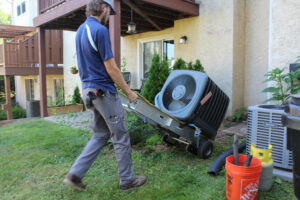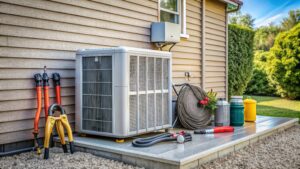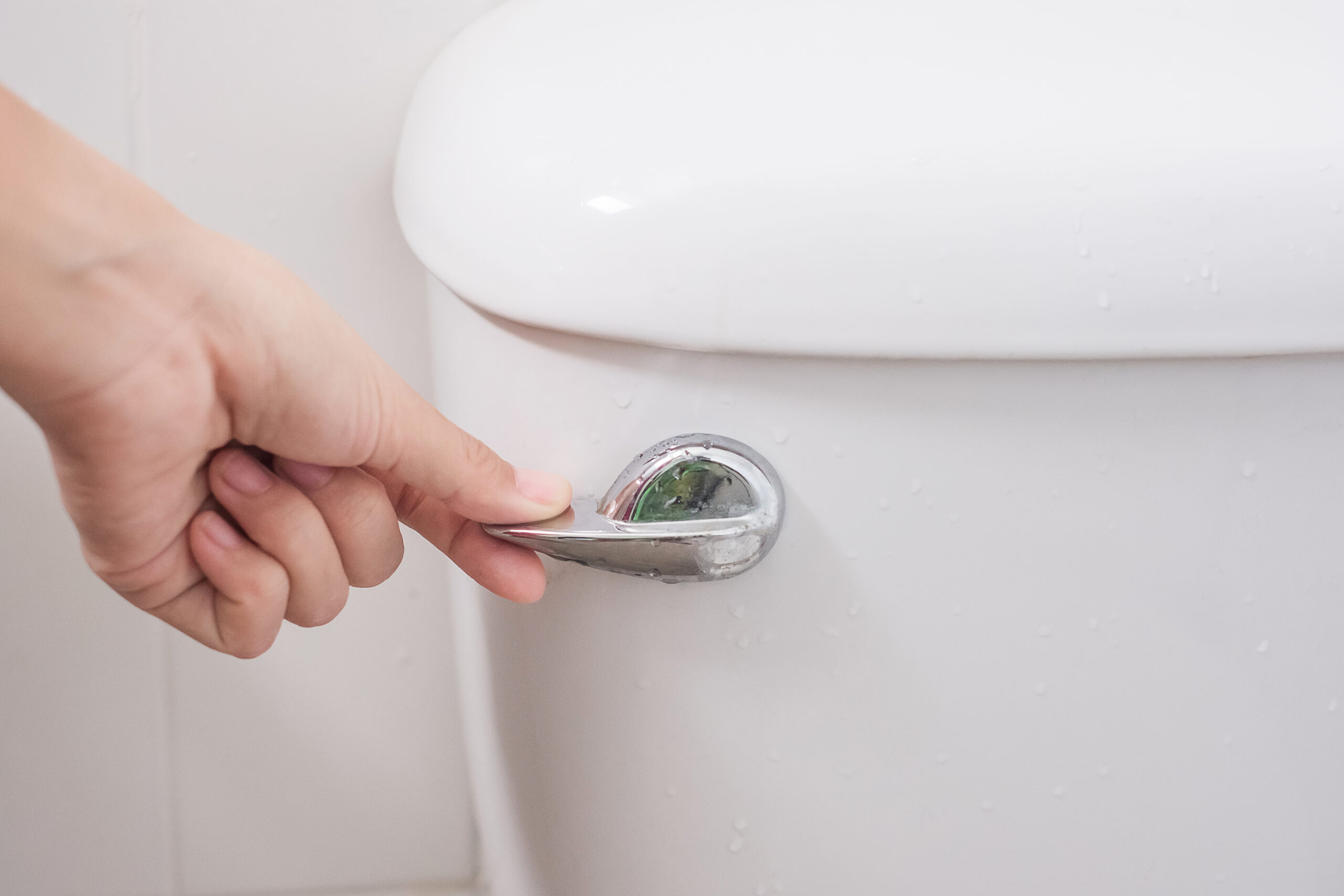|
Getting your Trinity Audio player ready...
|
Your HVAC system is among the most significant home investments you can make, as your heating and cooling equipment keeps your home healthy and your family comfortable.
But how long are they expected to last?
Like any mechanical system, HVAC systems have a finite lifespan, so understanding what factors influence their longevity can help you plan for repairs or replacement. It can also help you keep your system running smoothly, prolonging its operational life.
In other words, making these efforts while your heating or cooling equipment is running properly can potentially save you a lot of money down the line.
At Mattioni, our staff is dedicated to assisting homeowners to get the most out of their HVAC equipment. From providing picture-perfect installations to maintenance programs and step-by-step upkeep guidance to tailored replacement advice, our mission begins and ends with your home’s comfort.
Striking the right balance between maximizing your existing system and making the call to upgrade to a new one with improved efficiency can be like walking a fine line. But being too reactive and discounting factors like rising energy bills and decreasing comfort can slowly chip away at your household standards.
In this article, we’ll share some of our expert advice as we dive into the average lifespan of different HVAC systems, signs that indicate when it’s time for a replacement, and actionable tips to maximize your system’s life.
Average Lifespan of HVAC Systems By Type
The expected longevity of an HVAC system depends on the type of equipment, how well it’s installed and how well it’s maintained. A proper care routine for any heating or cooling system includes annual tune-ups, filter replacements, and cleanings. This type of care maximizes efficiency and minimizes wear and tear.
Here’s a breakdown of the average lifespans for the most common systems:
- Central Air Conditioners: Typically, a central AC unit that’s installed properly will last 10–12 years. With proper care and minimal strain, some durable units can push the upper limits of that range.
- Furnaces: Gas furnaces (propane and natural gas) tend to last about the same as central AC units, with a lifespan of 10-12 years. Oil furnaces, however, have a longer lifespan as they can last as long as 20 years with proper maintenance.
- Boilers: Most boilers are a bit more durable than other systems, with an expected operational life of 15-20 years. This applies to oil and gas boilers that receive sufficient maintenance yearly.
- Heat Pumps: Designed for both heating and cooling, heat pumps function similarly to central AC system. They also have a life expectancy of 10–12 with proper maintenance, which should be prioritized due to their constant use throughout the year.
- Ductless Mini-Split Systems: Known for their versatility and efficiency, ductless mini-splits can last 10–15 years, depending on usage and upkeep. After about 15 years, mini-splits typically experience a steep drop in efficiency.
Key Factors That Impact HVAC Lifespan
Several factors determine whether your HVAC system will meet or exceed its expected lifespan:
1. Quality of Installation: A poorly installed system can suffer from inefficiencies and breakdowns right from the get-go. Conversely, a professional quality installation ensures all components are connected properly, reducing any potential strain on the system.
Properly vetting your HVAC installation partner is a vital step that can improve efficiency and extend the operational life of the system.
2. Usage Patterns: The more you use your HVAC system, the faster its components will wear out. This is especially true for equipment running in extreme temperatures, or single-stage systems that experience many on/off sequences.
For example, single-stage heat pumps in colder climates and AC units in regions with prolonged summer heat often have shorter lifespans due to constant use.
3. Maintenance Routines: Systems that receive regular maintenance consistently last longer than those that don’t. Relatively basic tasks like changing air filters, cleaning coils, and annual professional tune-ups keep the system running smoothly.
Following a regular maintenance schedule is the clearest path to maximizing any HVAC system’s operational life.
4. System Size and Efficiency: Installing a system that’s sized for your home is crucial. An undersized unit will work overtime to cool or heat, wearing out faster, while an oversized unit may cycle on and off frequently, leading to individual component failure.
Factors that impact the heating (BTUs) and cooling (tons) needs of your home include its square footage, insulation rating, number of windows and doors, occupants, and the amount of sunlight it receives.
5. Environmental Factors: Outdoor units can be susceptible to damaging environmental conditions like salt, humidity, and extreme temperatures. Each of these can corrode or clog components.
Protecting your outdoor HVAC unit with proper housing and regular maintenance (at least once per year) can help counteract these factors and allow it to reach its full potential lifespan.

Signs Your HVAC System Is Nearing the End of Its Life
Even if your HVAC system is still running and providing some heating or cooling output, certain warning signs might indicate it’s time to consider replacing it:
1. Rising Energy Bills: If you’ve noticed a steady increase in your energy costs without a change in usage, an aging, inefficient cooling system is usually the prime suspect.
While one-off repairs can offer a “band-aid” solution to this, the system will likely run into a similar issue before long. This can be an early sign that replacing the unit soon is a financially prudent decision.
2. Frequent Repairs: When breakdowns become frequent, repair costs really start to add up. We often relate this situation to an aging car: the new car will potentially be a greater short-term financial strain, however, making repair payments for an aging one makes little sense considering you’ll be forced to replace it in the near future anyway.
If your system needs at least one major repair each year, investing in a new heating or AC unit may be more cost-effective.
3. Inconsistent Heating or Cooling: This issue can coincide with rising energy bills; if some rooms in your home are noticeably cooler or warmer than others, it could mean your system is struggling to distribute air properly.
If you’re running into inconsistent temperatures in your home, schedule an in-home consultation with a professional before making any final decisions as it can be caused by other things including ductwork issues.
4. Strange Noises: Grinding, rattling, or hissing sounds coming from your HVAC unit can indicate worn-out components, such as the blower motor or compressor.
Schedule a maintenance appointment to evaluate the extent of this problem.
5. Old Age: If your HVAC system has exceeded its expected lifespan—12 years for AC, furnaces and heat pumps, and 20 years for a boiler—it’s wise to begin planning for a replacement. Consult with a professional to evaluate how much longer you should expect operation from your heating or AC unit.
If you’ve gotten to this point, congrats on your HVAC successes – with the same maintenance, your next system should last just as long.
How to Extend the Life of Your HVAC System
With the right care, you can extend the life of your HVAC system and delay replacement. Here are a few proven methods:
1. Regular Maintenance: At the risk of sounding like a broken record, annual professional inspections are the best way to prolong the operational life of your system. They’ll be able to catch minor problems early and keep your system running efficiently.
Maintenance tasks include cleaning coils, checking refrigerant levels, and testing individual components such as the blower motor.
2. Proper Filter Care: One of the easiest and most effective ways to prolong your HVAC’s life is by replacing air filters regularly. While some HVAC professionals will tell you to do so every 1–3 months, replacing your air filter every 6-12 months is still a good schedule, depending on how much you use your heating and AC.
Dirty filters make the system work harder, increasing wear and tear, so set a reminder to replace your air filters. This can be done on your own without a professional, or during a professional tune-up appointment.
3. Smart Thermostat Usage: A programmable smart thermostat can prevent your system from running unnecessarily. By setting optimal temperatures when you’re away or asleep, you reduce strain on the unit.
Upgrading to a modern, industry-leading thermostat with energy efficiency features is a good way to extend your HVAC system’s life.
4. Energy-Efficient Upgrades: High-efficiency heating and AC systems (like variable-speed units) have a longer potential lifespan than less efficient models. This is because they experience fewer on/off sequences, which is the moment when the system encounters the most wear and tear.
Also, adding HVAC accessories like air purifiers or investing in zoned systems can reduce the workload on your HVAC by further increasing efficiency.
5. Sealing and Insulation: Ensuring your home and your ductwork are properly sealed and insulated will prevent air leaks, that would force your HVAC system to work harder to maintain temperature.
To evaluate your home’s current insulation rating, schedule an in-home consultation with an HVAC professional.

When to Replace vs. Repair Your HVAC System
As your heating and AC systems age, you’ll want to do everything you can to get the most out of them before purchasing a new unit. However, there comes a time when replacing the system is the more rational decision, both financially and for the comfort of your home.
How best to make the call whether to repair or replace your HVAC system depends on several factors:
1. Cost-Benefit Analysis of Repairs: If you’re spending a significant amount on repairs and still experiencing issues, replacement might be the more economical long-term choice.
The Mattioni HVAC team has a rule of thumb on this: if your system is out of warranty and a repair will cost over $1,000, then replacing the unit should be considered.
2. Consider Immediate Efficiency Improvements: New HVAC models often come with advanced features like variable-speed motors and smart connectivity, features that were previously less prevalent. Improvements in refrigerants have also led to newer units being far more energy-efficient than older systems.
For these reasons, upgrading usually leads not only to improved comfort but to lower energy bills too – a significant factor to work into your decision.
3. Take Environmental Impact into Account: Newer HVAC systems use eco-friendly refrigerants and consume less energy, making them better for the environment and reducing your carbon footprint.
4. Evaluate Financing Options: Many HVAC companies offer financing plans (we offer 12-month interest-free), and you also may be eligible for rebates or tax credits for installing energy-efficient systems, which can help offset the initial cost of replacement.
A new heating or AC system is a hefty investment, but finding a financing plan that works for you can make the purchase a much more viable option than it may seem at first.

How Urgently Should You Prioritize Your HVAC Replacement?
Many homeowners may be tempted to delay their next HVAC purchase with the belief that it will save them money. However, there comes a point where doing so will have the opposite effect.
By now, you should have a good understanding of how an old, inefficient system will incur hefty repair costs along with larger utility bills. Compound that with the reality that HVAC prices are only expected to increase in the future, and you can begin to see how upgrading sooner rather than later can be a smart financial move.
When exactly to purchase your next heating or AC system will depend on your specific situation, which includes your short-term budget. But don’t forget that there are many financing and payment plan options available that can make the investment more attainable.
Regardless of how old your systems are, be sure to follow a yearly maintenance schedule to ensure a healthy, long operational life. This can prevent minor issues from evolving into major ones.
The HVAC team at Mattioni has helped thousands of homeowners navigate this process, so we’re happy to assist you in any way. Our professionals are available by phone at (610) 400-8510, to answer any questions.
If your heating or cooling system has reached the end of its operational life, your next step is to schedule a free in-home consultation. Don’t wait until it breaks—stay proactive and schedule a professional inspection today.




